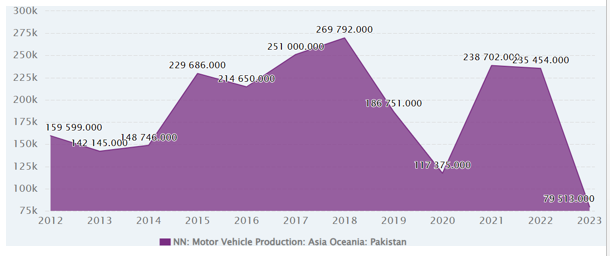INP-WealthPk
Amir Saeed
Electric vehicles are transforming the transportation industry by providing a more sustainable and cleaner alternative to traditional gasoline-powered cars, reducing the demand for fossil fuels, and drastically lowering greenhouse gas emissions, reports WealthPK. According to the CEIC, motor vehicle production in Pakistan was reported at 79,513 units in Dec 2023 and 235,454 units in 2022.

During Jul-March of Fiscal Year 2023, imports of petroleum products and crude oil remained at 6118.3 thousand tonnes and 5,858.4 thousand tonnes, respectively. Transport and power sectors are major consumers of petroleum products, making up around 89.3% of the total demand. According to the International Institute for Sustainable Development, emissions from the transport sector are projected to rise by 128% between 2012 and 2030. Emissions are forecast to grow from approximately 35.4 Mt CO2e in 2012 to approximately 80.7 Mt CO2e in 2030.

Speaking to WealthPK, Abdul Sami, President of Petroleum Association, said electric vehicles have no tailpipe emissions, the air quality is enhanced, and CO2 emissions are reduced. We can dramatically reduce the detrimental consequences of fossil fuel-powered transport on the oil import bill, public health, and climate change by switching to the electric vehicles. “The duty and tax for EVs should be reduced to a minimum. The government should grant this relaxation to Completely Built Units (CBUs); however, by the year 2025-26, this relaxation should only be granted to Completely Knocked Down (CKDs) units to encourage local automakers to manufacture EVs,’’ he said. He suggested that the government impose high tariffs on fossil fuel-powered cars to discourage their imports and promote electric cars. The provinces must also reduce registration fees and token taxes on EVs to enhance the demand for electric vehicles, he added.
Sami opined that it was indispensable to install the charging infrastructure in major cities and on major roads. Range anxiety can be reduced by providing charging infrastructure on major highways and motorways. “The government needs to establish public-private partnerships to promote entrepreneurship in the charging infrastructure sector. In addition to specialized charging stations, charging stations can be put in residences, workplaces, dining establishments, and retail centers,’’ he opined. Speaking to WealthPK, Shah Jahan Mughal, Regional Sales Manager at Islamabad-based E Turbo, said as compared to cars with internal combustion engines (ICEs), EVs use less energy. Since electric motors use a larger amount of grid electricity to propel the vehicle, EVs are ultimately more economical and environment-friendly.
He explained that the initial cost of an EV was higher but EVs saved money over time by requiring less maintenance cost. In general, electricity is cheaper than petrol enabling EVs to lead to more energy-efficient modes of transportation. He further explained that initially the electric bikes were not needed to register but now the government was charging Rs2,000 for registration. He lamented that instead of giving exemptions to promote EVs, the government was charging fee for registration of electric vehicles, making them more expensive. The E Turbo regional sales manager also suggested that the availability of EVs in installments and reduction in registration fees and other taxes would encourage the general public to use EVs.
Credit: INP-WealthPk




